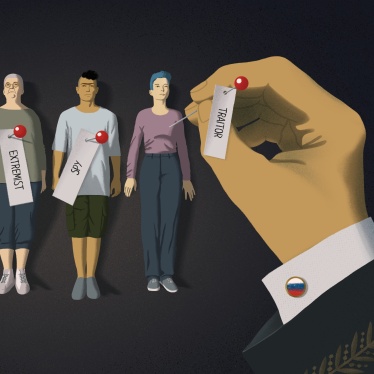The Uzbek government should immediately release independent journalist and human rights defender Ruslan Sharipov, Human Rights Watch said today.
“Ruslan Sharipov is in prison for speaking out against government corruption and human rights abuses,” said Rachel Denber, acting executive director of Human Rights Watch’s Europe and Central Asia Division. “His continued imprisonment is a disgrace.”
Last year, the Uzbek government released four other imprisoned human rights defenders. In December, however, the government dashed hopes that it would release Sharipov under a presidential amnesty, despite international pressure to do so. Yesterday marked the five-month anniversary of his conviction.
Sharipov was arrested on May 29. During the first days of his detention, arresting officers threatened Sharipov with physical violence, including rape with a bottle. In a letter smuggled out of prison, Sharipov confirmed that he was tortured. Until his trial on August 8, Sharipov had strenuously denied all charges. At the trial, however, Sharipov waived his right to counsel, declared his intention to plead guilty on all charges, and asked that the only outside observer to the proceedings—his mother—be removed from the courtroom, all of which gave rise to fears that his actions were coerced. Human Rights Watch is calling for an independent review of all the charges against Sharipov.
On August 13, the Tashkent City Court convicted Sharipov on charges of homosexual conduct (article 120 of the Uzbek Criminal Code), sex with a minor (article 128) and involving minors in “antisocial behavior” (article 127) and sentenced him to five and a half years in prison, reduced on appeal in September to four years. Sharipov arrived at that hearing with visible injuries to his face, raising fears that he was beaten in custody. Sharipov remains in prison, where he is at risk of torture and mistreatment.
Last month Human Rights Watch submitted a petition—signed by more than 650 people from around the world—to Uzbek President Islam Karimov, calling for the repeal of article 120.
“This is a Stalin-era sodomy law that provides a means to retaliate against dissenters, to invade the privacy and dignity of adults, and to promote invidious discrimination and hatred,” said Denber. “Sharipov’s case shows how easily sodomy laws can be used to stigmatize and repress activists.”
Article 120 violates basic human rights enshrined in the International Covenant on Civil and Political Rights, which Uzbekistan ratified in 1996. The United Nations Human Rights Committee, which monitors compliance with the Covenant, has found that laws punishing adult consensual homosexual acts violate the Covenant’s guarantees of non-discrimination and privacy and has held that sexual orientation is a status protected from discrimination by articles 2 and 26 of the Covenant.







